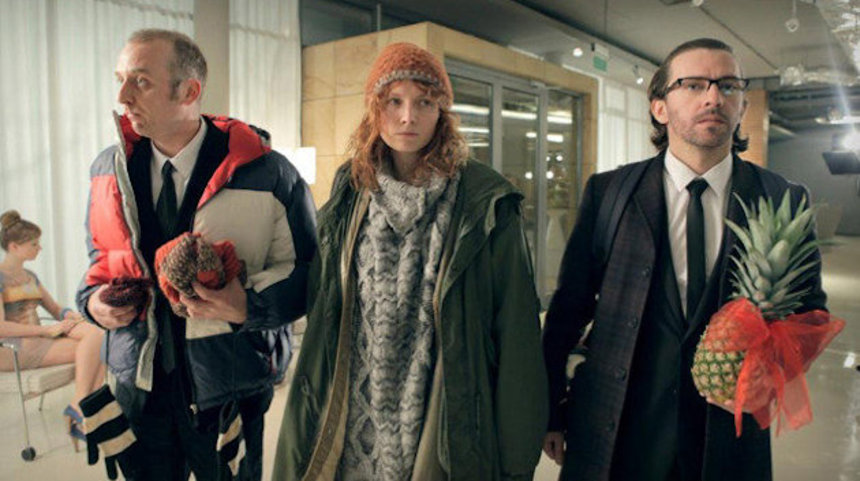Review: THE GIRL FROM THE WARDROBE, A Tragicomedy With A Lot of Heart

In its own quirky and ambiguously ironic manner, The Girl from the Wardrobe emphasizes that even though on the surface most of us might look happy with our lives, deep down we all long for closeness and safety that would make our existence seem worthwhile. I'm pretty certain that this may sound like a boring cliché of sorts, yet Kox's confidence and distinctly individual approach to the aforementioned topic allows him to exploit a familiar notion with much ease, heart, and passion.
Kox's inexperienced, but observant and inquisitive directorial eye tends to diverge from what's conventional in Polish cinema, as he creates a distinctly imaginative and emotional picture that possesses the unusual ability to jump from melodrama to farce, and back again, with truly impressive results. Dialogues vary from laugh-out-loud hilarious to down-to-earth ponderous, but they never feel forced, and thus make it seem as if every sentence has some special meaning.
The Girl from the Wardrobe tells the story of two brothers, who live together in one of Warsaw's typical apartment buildings. Nothing would be strange about that, perhaps, if not for the fact that Tomek (Wojciech Mecwaldowski) has a neurological disease, which works as a predetermining factor in his alienation not only from society, but also from his loving sibling Jacek (Piotr Głowacki). Tomek doesn't speak much, but when he does it's mostly curse words or sentences previously overheard in various places. Though surprisingly shy and quiet, he's prone to violence towards other people.
Although Jacek appears to be a truly caring and compassionate man, he also self-consciously characterizes himself as a modern Casanova and devotes a huge amount of his time to different women. It sounds a bit harsh, but Tomek's illness gradually becomes a nuisance and acts like a major obstacle in Jacek's wild nightlife. When his womanizing brother's out and playing, Tomek normally stays with their nosy and boorish neighbor Kwiatkowska (Teresa Sawicka). What's worth mentioning is that this old lady, who has an irritating tendency to mock other people's misfortunes, perfectly impersonates the outside world, from which the characters try to hide. She groundlessly judges everyone around her, an act intended to conceal her own lack of confidence.
Coincidence finally leads to a chance encounter with the girl next door, Magda (Magdalena Rozanska), the titular girl from the wardrobe. Apparently, she deals with all the stress coming from the outside world by isolating herself from everyone in her cramped apartment. Magda desperately tries to explain her depression and suicidal tendencies through a philosophical monologue that works fine as a protection from insanity, but fails as a genuine excuse for her worrying actions.
Like the children in The Chronicles of Narnia, Magda attempts to find safety and solace in an imaginary world created from many contrasting emotions. The magical place she designs - with a little help of drugs, however - works like a fine shelter from the harsh reality. It's as kitschy as it is colorful, but surprisingly homey and peaceful, hence in perfect contrast with the dark aura of the outside world. Unlike Narnia, it has a more somber and sober atmosphere, and its deceptive powers are tragically elusive.
The only person that Magda invites to this dreamlike realm is Tomek. Through mutual understanding, they realize that social detachment can have many distinct faces, but the core of the problem remains the same. Soon they both realize that the only joyful moments of their complicated lives are the ones spent together doing exactly nothing. But for them that nothingness is the key to discovering spiritual truth.
Since Dustin Hoffman's awe-inspiring performance in Rain Man, I haven't seen a more disturbing and believable depiction of mental disorder than Mecwaldowski's. Though a regular comedy actor, he attends to his role with much care and understanding, keeping the portrayal of serious illness at a perfectly healthy level.
What impressed me is that The Girl from the Wardrobe never treats itself too seriously, but finds a fine line between drama and comedy, even though the tone gradually aims for something more meditative and sorrowful. While the important and difficult message of the film remains visible throughout the whole running time, The Girl from the Wardrobe has great potential to be remembered, not only as a meaningful picture, but also a most pleasurable and heartwarming one. As far as I can tell, it's the best Polish indie film of 2013.
The Girl from the Wardrobe
Director(s)
- Bodo Kox
Writer(s)
- Bodo Kox
Cast
- Wojciech Mecwaldowski
- Piotr Glowacki
- Magdalena Rózanska
- Eryk Lubos

Do you feel this content is inappropriate or infringes upon your rights? Click here to report it, or see our DMCA policy.






